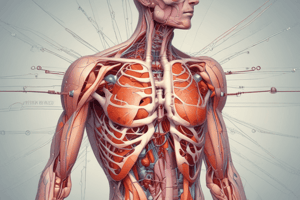Podcast
Questions and Answers
What is the primary function of the immune system?
What is the primary function of the immune system?
- Defense against infectious disease-causing microbes (correct)
- Regulation of body temperature
- Production of hormones
- Digestion of food
What term is derived from the Latin word 'immunitas,' meaning protection of Roman politicians from prosecution?
What term is derived from the Latin word 'immunitas,' meaning protection of Roman politicians from prosecution?
- Immunity (correct)
- Infection
- Immunization
- Immunology
Who was the first to make a vaccine?
Who was the first to make a vaccine?
- Edward Jenner (correct)
- Robert Koch
- Louis Pasteur
- Alexander Fleming
Which of the following is NOT a feature of innate immunity?
Which of the following is NOT a feature of innate immunity?
Which type of immunity is characterized by a delayed response but has memory?
Which type of immunity is characterized by a delayed response but has memory?
Which cells are primarily responsible for humoral immunity?
Which cells are primarily responsible for humoral immunity?
Which type of immunity is most effective against intracellular microbes?
Which type of immunity is most effective against intracellular microbes?
What type of immunity involves the transfer of serum antibodies or lymphocytes from an immune individual to a naive individual?
What type of immunity involves the transfer of serum antibodies or lymphocytes from an immune individual to a naive individual?
What is the principle behind the clonal selection hypothesis?
What is the principle behind the clonal selection hypothesis?
Which feature of adaptive immune responses refers to the ability to remember and respond more vigorously to repeated exposure to the same microbe?
Which feature of adaptive immune responses refers to the ability to remember and respond more vigorously to repeated exposure to the same microbe?
What does nonreactivity to self mean in the context of the immune system?
What does nonreactivity to self mean in the context of the immune system?
The primary function of the immune system is to regulate metabolism.
The primary function of the immune system is to regulate metabolism.
The immune response is the collective and coordinated response by the immune system to foreign substances.
The immune response is the collective and coordinated response by the immune system to foreign substances.
Edward Jenner was the first to make a vaccine.
Edward Jenner was the first to make a vaccine.
Innate immunity has a delayed response and memory.
Innate immunity has a delayed response and memory.
Adaptive immunity is characterized by strict specificity for distinct macromolecules associated with a pathogen.
Adaptive immunity is characterized by strict specificity for distinct macromolecules associated with a pathogen.
Innate immunity can stimulate adaptive immune responses and influence their nature.
Innate immunity can stimulate adaptive immune responses and influence their nature.
B lymphocytes are responsible for cell-mediated immunity.
B lymphocytes are responsible for cell-mediated immunity.
Cellular immunity is important for defense against intracellular microbes such as viruses and some bacteria.
Cellular immunity is important for defense against intracellular microbes such as viruses and some bacteria.
Passive immunity generates memory and is long-lasting.
Passive immunity generates memory and is long-lasting.
The clonal selection hypothesis states that a given lymphocyte produces only one type of antigen-specific molecule.
The clonal selection hypothesis states that a given lymphocyte produces only one type of antigen-specific molecule.
Adaptive immune responses are capable of clonal expansion in response to antigen stimulation.
Adaptive immune responses are capable of clonal expansion in response to antigen stimulation.
Immunological memory refers to the immune system's ability to remember past infections and respond more effectively to subsequent exposures.
Immunological memory refers to the immune system's ability to remember past infections and respond more effectively to subsequent exposures.
Flashcards are hidden until you start studying
Study Notes
Immune System
- The primary function of the immune system is to defend against infectious disease-causing microbes.
- The term "immunity" is derived from the Latin word "immunitas," meaning protection of Roman politicians from prosecution.
Primary Physiologic Function
- The primary physiologic function of the immune system is to eradicate established infections.
Vaccination
- Edward Jenner was the first to make a vaccine.
Innate Immunity
- Innate immunity has a rapid response to microbes.
- It reacts in essentially the same way to repeated infections.
- It exists prior to infection.
- It does not have memory.
Adaptive Immunity
- Adaptive immunity is characterized by a delayed response but has memory.
- It has strict specificity for distinct macromolecules associated with a pathogen.
- It can stimulate innate immunity and influence its nature.
Humoral Immunity
- B lymphocytes are primarily responsible for humoral immunity.
- Humoral immunity is not effective against intracellular microbes.
Cellular Immunity
- Cellular immunity is effective against intracellular microbes such as viruses and some bacteria.
- It is important for defense against intracellular microbes.
Passive Immunity
- Passive immunity involves the transfer of serum antibodies or lymphocytes from an immune individual to a naive individual.
- It does not generate memory and is not long-lasting.
Clonal Selection Hypothesis
- The clonal selection hypothesis states that only lymphocytes bearing an antigen-specific receptor will become activated during an adaptive immune response.
- It also states that a given lymphocyte produces only one type of antigen-specific molecule.
Adaptive Immune Responses
- Adaptive immune responses are capable of clonal expansion in response to antigen stimulation.
- They have memory and can respond more vigorously to repeated exposure to the same microbe.
- Immunological memory refers to the immune system's ability to remember past infections and respond more effectively to subsequent exposures.
Studying That Suits You
Use AI to generate personalized quizzes and flashcards to suit your learning preferences.




